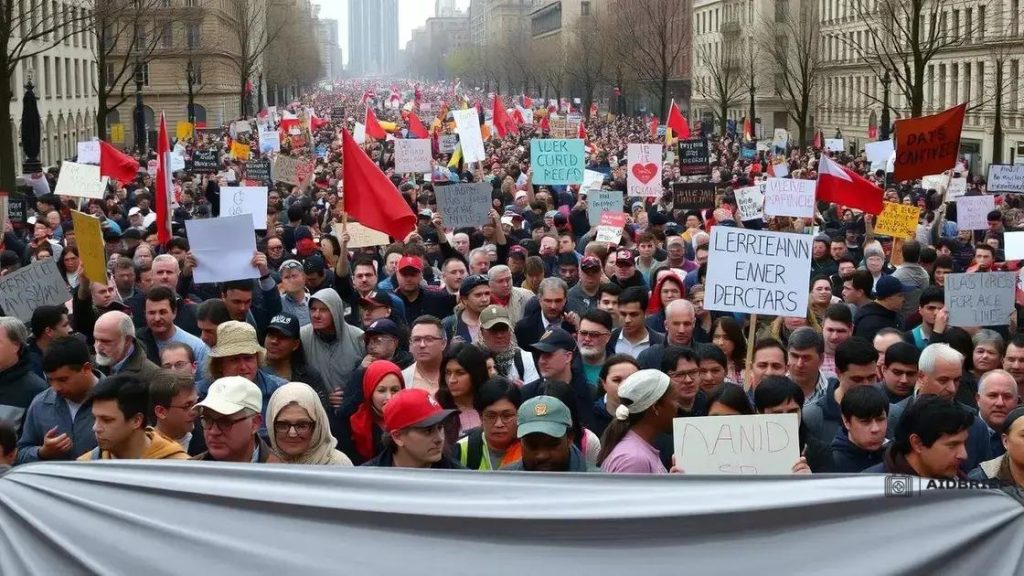Nationwide protest coverage: staying informed and engaged

To stay updated on nationwide protests, utilize social media for real-time updates, follow reliable news sources for in-depth coverage, engage with local community groups for localized information, and participate in online discussions to gain diverse perspectives.
Nationwide protest coverage offers insightful perspectives on social movements shaping our world today. Ever wondered how these events affect your community? Let’s explore!
Understanding the context of nationwide protests
Understanding the context of nationwide protests is crucial for anyone wanting to grasp the dynamics of societal change. These movements often arise from a blend of political, social, and economic factors. It’s important to explore the reasons behind these protests and how they reflect the collective sentiments of a population.
Historical Background
The context of nationwide protests often has historical roots. Various events, such as civil rights movements or significant governmental policies, can trigger widespread demonstrations. Recognizing these historical events helps us understand current movements more deeply.
Key Factors Influencing Protests
- Social Inequality: Many protests stem from public frustration over social injustice and inequality.
- Government Policies: Specific policies can spark outrage, leading citizens to mobilize against perceived injustices.
- Cultural Moments: Societal shifts in values, such as increased awareness of climate change, also play a part in motivating protests.
Additionally, the role of grassroots organizations cannot be overlooked. These groups often lay the groundwork for mobilizing protests, focusing on particular issues or communities. For instance, local organizations might target environmental issues, advocating for change at a national level.
Media’s Role in Protests
The media significantly shapes public understanding of protests. With the rise of social media, information spreads rapidly, allowing movements to gain momentum. When citizens see others taking action on social platforms, it encourages them to join in or support similar causes.
Furthermore, media coverage can either highlight or downplay aspects of protests. Reporters may focus on certain narratives, which can influence public perception. Therefore, consumers of news should critically evaluate the information presented to them.
Understanding the context of nationwide protests is essential for meaningful engagement. By exploring the underlying causes and considering the historical perspective, individuals can appreciate the complexities of these movements and become informed participants in societal discussions.
Key issues fueling protests across the country
Various key issues are fueling protests across the country, highlighting the urgent concerns of many citizens. These factors often intersect, creating a powerful call for action from individuals seeking change.
Social Justice and Equality
The fight for social justice is at the forefront of many protests. Issues such as racial inequality and systemic discrimination motivate groups to rally for equality and fair treatment. This urge to address long-standing injustices drives protests around the nation.
Economic Disparities
Economic inequality also plays a significant role in sparking protests. Many people feel left behind as they struggle to make ends meet. As a result, protests often focus on themes of living wages, affordable housing, and job security.
- Living Wages: Protesters demand fair compensation for work, advocating for minimum wage increases.
- Affordability: The rising cost of living pushes people to speak out for affordable housing and healthcare.
- Job Security: Concerns over job losses and unstable employment contribute to the urgency of these protests.
Alongside these issues, climate change has emerged as another critical point of contention. As environmental disasters become more frequent, calls for action intensify. Many protesters advocate for sustainable practices and urgent governmental action to combat climate change.
Political Accountability
Political accountability remains a vital concern as well. Citizens are increasingly demanding transparency and integrity from their leaders. When politicians fail to address the needs of their constituents, protests often arise in response.
Understanding these key issues shows that nationwide protests are not merely spontaneous events; they are fueled by deep-rooted frustrations and aspirations for a better future. By recognizing these themes, we can better appreciate the motivation behind the movement and the significant changes they seek to achieve.
The role of social media in protest coverage

The role of social media in protest coverage cannot be overstated. It has transformed the way information spreads, making it easier for people to learn about and engage in movements across the nation.
Instant Communication
Social media platforms allow for instant sharing of news and updates related to protests. Users can quickly access real-time information, which helps to mobilize supporters. When a protest occurs, people can share videos and images, capturing the essence of the moment.
Grassroots Mobilization
Another significant aspect of social media is its ability to facilitate grassroots mobilization. Activists can organize events through platforms like Twitter and Facebook. Hashtags create a sense of unity, enabling supporters to connect with each other. For example, hashtags like #BlackLivesMatter have seen widespread use, bringing people together to advocate for justice.
- Visibility: Social media increases the visibility of social issues by reaching a vast audience.
- Community Support: Online platforms foster community support, allowing individuals to connect and share resources.
- Direct Engagement: Users can engage directly with organizations and leaders, asking questions and providing feedback.
Furthermore, social media often serves as a platform for diverse voices. Many individuals can share their experiences and perspectives on protests, further enriching the conversation. This has empowered marginalized groups to speak out and gain recognition.
Challenges of Misinformation
However, while social media offers many advantages, it also poses challenges. Misinformation can spread rapidly, leading to confusion and misinterpretation of events. It is essential for users to verify information before sharing, ensuring they contribute to an accurate narrative.
In summary, social media plays a pivotal role in protest coverage by fostering communication, grassroots mobilization, and visibility. Understanding its influence helps us appreciate the dynamics of contemporary protests and the myriad ways people express their concerns and support for change.
Impact of nationwide protests on public opinion
The impact of nationwide protests on public opinion is profound and multifaceted. As protests gain visibility, they can shift how society perceives key issues.
Changing Perspectives
Protests often challenge the status quo, prompting people to reconsider their views. Many individuals who may not have engaged with certain topics can find themselves questioning their beliefs as they see public demonstrations.
Media Coverage Influence
The way the media covers these events also plays a significant role. Positive and negative portrayals can shape public sentiment. For instance, when the media highlights peaceful protests, it can create sympathy and support for the cause.
- Emotional Resonance: Footage of real people affected by issues can evoke empathy.
- Strong Narratives: Compelling stories from the protests can make abstract issues feel personal.
- Broad Reach: Social media shares can amplify messages beyond traditional news
In many cases, a well-publicized protest can lead to increased awareness and even policy changes. Policymakers often feel the pressure to respond to public opinion shaped by these demonstrations. For example, issues like racial justice and climate change gain traction in the political arena partly due to the collective voice of protests.
Counter Movements
It is essential to recognize that protests can also spark counter movements. People may feel threatened by the changes advocates seek, which can lead to opposing groups forming. This back-and-forth can create a more significant dialogue about the issues at hand, although it can sometimes lead to increased polarization.
Understanding the impact of nationwide protests on public opinion helps illustrate the dynamic relationship between activism and societal change. As protests occur, they serve as platforms for voices that might otherwise go unheard, ultimately shaping a more informed public.
How to stay updated on ongoing protests
Staying updated on ongoing protests is essential for anyone wanting to understand the current social climate. With multiple sources of information available, it’s important to know how to navigate them effectively.
Utilize Social Media
Social media platforms are powerful tools for real-time updates about protests. Following hashtags related to specific movements can provide insights into events as they happen. Twitter, for instance, has become a go-to platform for live reporting. Users can find firsthand accounts and share what’s happening in different locations.
Follow Reliable News Outlets
In addition to social media, it’s vital to follow trustworthy news outlets. Major news organizations often provide detailed coverage of protests, including analysis and context. Setting up alerts on these platforms can ensure that you receive notifications about significant developments.
- Notifications: Enable notifications for news apps to get instant updates.
- Newsletters: Subscribe to newsletters from reputable sources for curated content.
- Podcasts: Many news outlets produce podcasts that discuss ongoing events in depth.
Another effective method is to engage with local community organizations. These groups often have their own channels for disseminating information. Joining community forums or email lists can provide tailored updates that are directly relevant to your area.
Participate in Online Discussions
Engaging in online discussions on platforms like Reddit or Facebook can further enhance your understanding of ongoing protests. Communities often share resources, links, and personal experiences regarding events, which can help you stay informed. This collective knowledge can be incredibly valuable.
By combining these strategies—utilizing social media, following reliable news outlets, engaging with local organizations, and participating in online discussions—you can ensure you stay well-informed about ongoing protests and their significance.
FAQ – Frequently Asked Questions about Nationwide Protests
How can social media help me stay informed about protests?
Social media platforms provide real-time updates, allowing you to follow hashtags and engaging discussions about ongoing protests.
What reliable news sources should I follow for protest coverage?
Stay updated by following major news organizations that offer detailed reporting and analysis of protests and social movements.
How can local community groups enhance my understanding of protests?
Local community organizations often provide specific insights and updates about protests happening in your area, making it easier to stay engaged.
What are effective ways to participate in discussions about protests?
Join online forums or social media discussions where diverse perspectives are shared, and engage respectfully to broaden your understanding.





